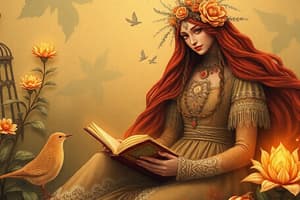Podcast
Questions and Answers
What is the fundamental difference between a theme and a topic in a literary work?
What is the fundamental difference between a theme and a topic in a literary work?
- A topic is the subject matter of the story, while a theme is the author's commentary on it. (correct)
- Themes are always stated explicitly in the text, while topics are implied through the plot.
- A topic is a recurring motif that emphasizes the theme.
- A theme is a specific lesson or takeaway, while a topic is a broader idea.
Which of these thematic elements are used to explore and develop a theme in a literary work?
Which of these thematic elements are used to explore and develop a theme in a literary work?
- Character development, plot structure, setting, and conflict.
- Symbolism, imagery, metaphors, and similes.
- Dialogue between characters, internal monologues, and narration.
- All of the above. (correct)
Which of the following statements accurately reflects the relationship between theme and moral in a literary work?
Which of the following statements accurately reflects the relationship between theme and moral in a literary work?
- Morals are explicit takeaways, while themes are broader and open to interpretation. (correct)
- Morals and themes are interchangeable terms with the same meaning.
- A theme is the moral lesson, and the moral is the broader idea explored.
- Themes are used to develop morals, but morals do not necessarily support themes.
Which of these literary works exemplifies the theme of "Justice" as discussed in the text?
Which of these literary works exemplifies the theme of "Justice" as discussed in the text?
Should authors plan their themes in advance?
Should authors plan their themes in advance?
Flashcards
Theme
Theme
The deeper meaning of a story, combining idea and opinion.
Theme vs. Topic
Theme vs. Topic
Topic is what the story is about; theme reveals the author's viewpoint.
Motif
Motif
A recurring symbol or idea that supports the theme.
Common Themes
Common Themes
Signup and view all the flashcards
Importance of Themes
Importance of Themes
Signup and view all the flashcards
Study Notes
What is Theme?
- Theme is the deeper meaning of a story, not just the topic.
- It's the author's idea and opinion expressed through the characters, plot, setting, conflict, and literary devices.
- Themes are not explicitly stated.
Theme vs. Other Literary Elements
- Theme is different from topic: Topic is what the story is about, while theme is what the author says about it.
- Different from motif, which is a recurring symbol or idea that reinforces the theme.
- Different from moral, which is a direct lesson, while theme is broader and open to interpretation.
Common Themes in Literature
- Justice (e.g., To Kill a Mockingbird, Hamlet)
- Coming of Age (e.g., Jane Eyre, Great Expectations)
- Fate vs. Free Will (e.g., Romeo & Juliet, The Alchemist)
- Power & Corruption (e.g., Animal Farm, Macbeth)
- Loneliness (e.g., A Clean, Well-Lighted Place, The Catcher in the Rye)
- Man vs. Society (e.g., 1984, Fahrenheit 451)
- Survival (e.g., The Road, Lord of the Flies)
- Sacrificial Love (e.g., Beloved, The Leavers)
- Revenge (e.g., The Count of Monte Cristo, Medea)
Why Themes Matter
- Themes give stories depth and meaning.
- Themes shape character choices and plot.
- Themes help readers connect with and interpret the story.
Planning Themes
- Planning theme in advance is possible for stories with a specific intended message.
- Spontaneous theme development is also a valid approach, allowing themes to emerge naturally during writing.
Studying That Suits You
Use AI to generate personalized quizzes and flashcards to suit your learning preferences.




